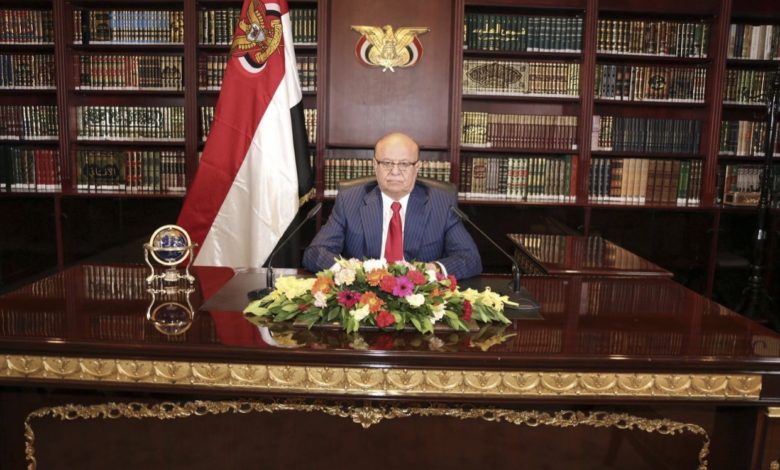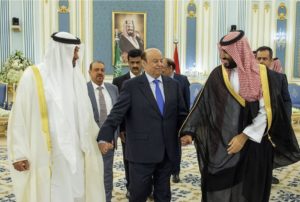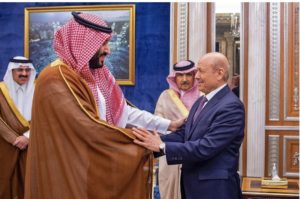Saudi Arabia Pushed Yemen’s Elected President to Step Aside, Saudi and Yemeni Officials Say

free Yemen Eye
By Summer Said and Stephen Kalin
April 17, 2022 3:46 pm ET
Abed Rabbo Mansour Hadi is largely confined to his home in Riyadh after handing power to new governing council
RIYADH, Saudi Arabia—Saudi Arabia pushed Yemeni President Abed Rabbo Mansour Hadi to step down earlier this month, and Saudi authorities have largely confined him to his home in Riyadh and restricted communications with him in the days since, according to Saudi and Yemeni officials.
On April 7, Mr. Hadi handed power to a council of eight representatives of different Yemeni groups, as Saudi Arabia looks for ways to end a seven-year civil war in Yemen that has caused a humanitarian crisis and damaged the kingdom’s relations with Washington.
On the sidelines of talks among Yemeni politicians in Riyadh that week, Crown Prince Mohammed bin Salman, Saudi Arabia’s day-to-day leader, presented Mr. Hadi with a written decree delegating his powers to the council, according to the Saudi and Yemeni officials.
Prince Mohammed told him the other Yemeni leaders had agreed it was time for him to relinquish power, those officials said.
Saudi officials, who have backed Yemen’s government in its fight against Houthi rebels allied with Iran, threatened to publicize what they said was evidence of corruption allegedly committed by Mr. Hadi as they sought to get him to give up power, the Saudi and Yemeni officials said.

Now, “Hadi is effectively under house arrest at his residence in Riyadh without access to phones,” said a Saudi official. A second Saudi official said that a few Yemeni politicians had been allowed to meet him, with the prior approval of Saudi authorities.
Another Saudi official, in response to a request for comment, said various pro-government Yemeni factions had lost confidence in Mr. Hadi’s ability to lead peace negotiations and asked Riyadh to encourage him to resign. The official said Saudi Arabia didn’t pressure him and denied that he was under house arrest or barred from traveling.
“Saudi Arabia has not orchestrated the removal of Hadi nor threatened to expose alleged corruption,” the Saudi official said. “Its role was limited to conveying the desire of the Yemeni factions who participated together in the Yemeni-Yemeni talks to President Hadi.”
Abdullah al-Alimi, director of the Yemeni president’s office and vice president of the new Presidential Leadership Council, denied Mr. Hadi was under house arrest but said he would need time to arrange for a call with him.

Mr. Hadi couldn’t be reached for comment. His former press secretary, Mukhtar al-Rahbi, said Mr. Hadi’s removal violated the constitution and disenfranchised the millions of Yemenis who voted for him.
The Houthis rejected the Yemeni government’s new leadership council, saying it had been imposed by a foreign power. They demanded an end to what they describe as Saudi interference.
The 76-year-old Mr. Hadi won Yemen’s last peacetime election unopposed in 2012 and fled the capital, San’a, in 2015 after it was overrun by Houthi forces. He has lived in Riyadh since then at a residence provided by Saudi Arabia.
Mr. Hadi’s term was originally supposed to last until 2014. It was extended by a year. He briefly resigned in 2015 before saying he would continue to serve until new elections could be held.
Saudi Arabia entered Yemen’s civil war in 2015 to help Mr. Hadi’s internationally recognized government. His removal this month was framed by the Saudis and members of the council that replaced him as an effort to unite disparate forces opposed to the Houthis ahead of peace talks or a renewed offensive.
Divisions among anti-Houthi forces remain, however, and some questioned the legitimacy of the new council.
Riyadh’s intervention in Yemen has dragged on, and the conflict has killed tens of thousands of civilians, according to the United Nations, while costing the kingdom billions of dollars, according to analysts. The war has strained Saudi Arabia’s relations with the U.S., which nonetheless has supported the Saudi campaign with weapons and intelligence.
After meeting the head of the new leadership council last week, Cathy Westley, the U.S. chargé d’affaires for the U.S. mission to Yemen based in Riyadh, said she welcomed its commitment to a United Nations-brokered truce announced earlier this month.
A State Department spokesperson, when asked about the risk of Mr. Hadi’s removal generating instability, said the U.S. has pressed for transparent, Yemeni-led efforts to reform the government to ensure it can meet the needs of all its citizens.
Mr. Hadi’s ouster came at the end of a week of talks in Riyadh for which hundreds of Yemeni politicians were offered Saudi residency permits and financial payments to attend, according to participants in the meetings.
The talks generated some notable encounters between rival leaders. But discussions were often tense, with participants coming to blows in private sessions and producing little agreement, participants said. Mr. Hadi wasn’t included in the discussions, they said.





